“I am always thinking of you and helping you to secure Eternal Life.”
As Pope Pius XII wrote “Christ is the way; Mary reflects the way; her scapular is our keepsake on the way.”
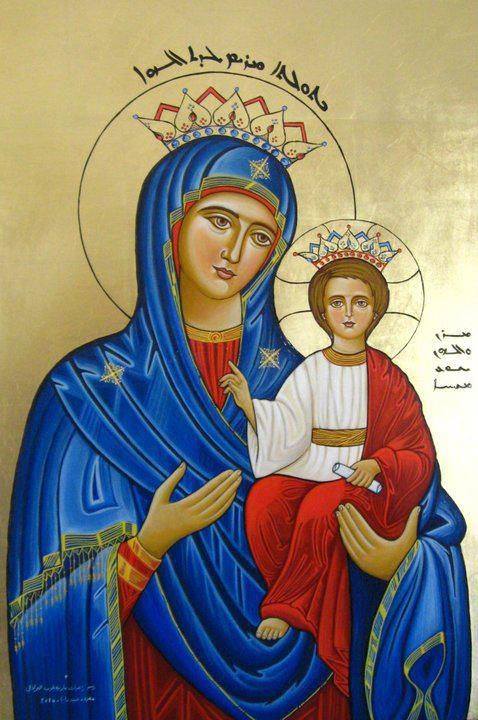 In another place, I posted the following on Mary’s place in the theology of St Ephrem.
In another place, I posted the following on Mary’s place in the theology of St Ephrem.
The month of May is traditionally known on as the Month of Mary. The Church holds Mary in the highest esteem; she is venerated but not worshipped by Catholics and Orthodox. A Syrian Father, St Ephrem, –the Harp of the Holy Spirit– the fourth century hymnographer, theologian and deacon as something to offer about the Mother of God.
“As lightning illuminates what is hidden, so also Christ purifies what is hidden in the nature of things. He purified the Virgin also and then was born, so as to show that where Christ is, there is manifest purity in all its power. He purified the Virgin, having prepared Her by the Holy Spirit… having been born, He left Her virgin. I do not say that Mary became immortal, but that being illuminated by grace, She was not disturbed by sinful desires”
“Most holy Lady, Mother of God, alone most pure in soul and body, alone exceeding all perfection of purity… alone made in thy entirety the home of all the graces of the Most Holy Spirit, and hence exceeding beyond all compare even the angelic virtues in purity and sanctity of soul and body… my Lady most holy, all-pure, all-immaculate, all-stainless, all-undefiled, all-incorrupt, all inviolate spotless robe of Him Who clothes Himself with light as with a garment… flower unfading, purple woven by God, alone most immaculate.”
“There is in you, Lord, no stain, nor any spot in your mother.”
“You Jesus and your mother are the only ones who are beautiful in all aspects. Because in you, O Lord, there is no deformation, and in your mother, there is no stain.”
“The two women were pure and simple, Mary and Eve. One of them, however, became the cause of our death and the other, the cause of our life.”
St. Ephrem the Syrian
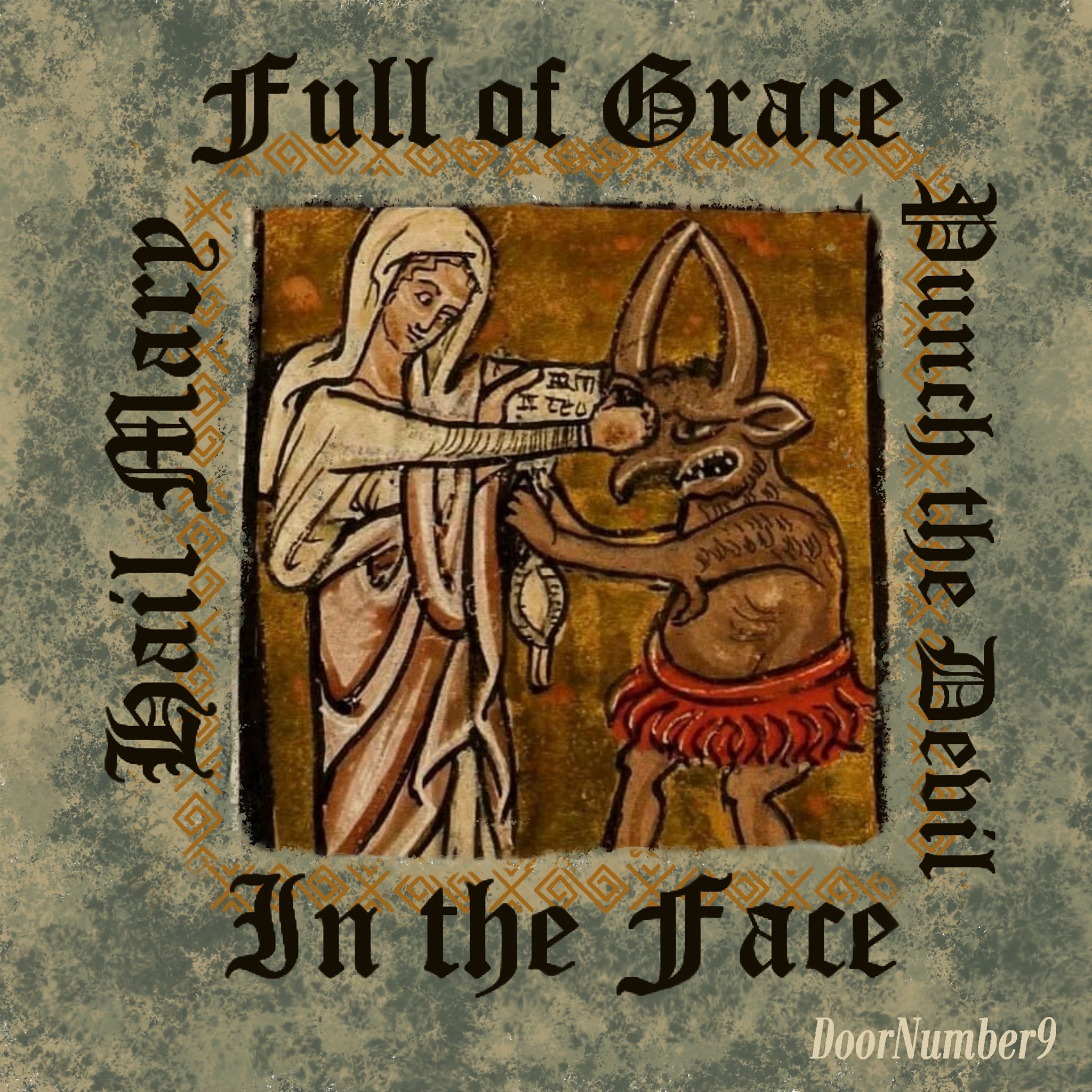 We begin the month of May and therefore the month of Mary.
We begin the month of May and therefore the month of Mary.
“The correct Marian devotion guarantees to faith the coexistence of indispensable ‘reason’ with the equally indispensable ‘reasons of the heart,’ as Pascal would say. For the Church, man is neither mere reason nor mere feeling, he is the unity of these two dimensions. The head must reflect with lucidity, but the heart must be able to feel warmth: devotion to Mary (which ‘avoids every false exaggeration on the one hand, and excessive narrow-mindedness in the contemplation of the surpassing dignity of the Mother of God on the other,’ as the Council urges) thus assures the faith its full human dimension.” (Vittorio Messori, The Ratzinger Report, Ignatius Press, 1985)
What Marian devotions will you take part in this month?
 “Who are you, O Immaculate Conception?” asks St Maximillian Maria Kolbe, the 20th century martyr and saint who founded a Marian movement. Accordingly, he teaches us, based on his prayer and experience, that the perfect love of the Holy Trinity meets an adequate response in the perfect love of the Immaculate, which is the name St Maximilian gives to the Blessed Virgin Mary. In another place he says, “In the union of the Holy Spirit with her, not only does love bind these two beings, but the first of them [the Holy Spirit] is all the love of the Most Holy Trinity, while the second [the Blessed Virgin Mary] is all the love of creation, and thus in that union heaven is joined to earth, the whole heaven with the whole earth, the whole of Uncreated Love with the whole of created love: this is the vertex of love.”
“Who are you, O Immaculate Conception?” asks St Maximillian Maria Kolbe, the 20th century martyr and saint who founded a Marian movement. Accordingly, he teaches us, based on his prayer and experience, that the perfect love of the Holy Trinity meets an adequate response in the perfect love of the Immaculate, which is the name St Maximilian gives to the Blessed Virgin Mary. In another place he says, “In the union of the Holy Spirit with her, not only does love bind these two beings, but the first of them [the Holy Spirit] is all the love of the Most Holy Trinity, while the second [the Blessed Virgin Mary] is all the love of creation, and thus in that union heaven is joined to earth, the whole heaven with the whole earth, the whole of Uncreated Love with the whole of created love: this is the vertex of love.”
St Maximillian gave us a mature perspective of Mary under this title.
The dogma of the Immaculate Conception of the Blessed Virgin Mary was declared and defined by Bl. Pius IX in 1854: “The most Blessed Virgin Mary was, from the first moment of her conception, by a singular grace and privilege of almighty God and by virtue of the merits of Jesus Christ, Savior of the human race, preserved immune from all stain of original sin.” (Ineffabilis Deus )
Since Mary under the title of the Immaculate Conception let us pray for our nation today.
 Today is the feast of the Presentation of the Blessed Virgin Mary into the Temple. Latin Catholics and the new calendar Eastern Christians (Catholic and Orthodox) celebrate a feast with the biblical basis in a book that is not part of the canonical Scriptures, the Proto-Evangelium of James.
Today is the feast of the Presentation of the Blessed Virgin Mary into the Temple. Latin Catholics and the new calendar Eastern Christians (Catholic and Orthodox) celebrate a feast with the biblical basis in a book that is not part of the canonical Scriptures, the Proto-Evangelium of James.
The meditation by Sister Vassa Larin herein asks a good question in our participating in liturgical services, or merely paying lip-service to the Divine Majesty, the Mother of God or the saints when we do not have our spiritual life put in order or at least trying to live rightly. The spiritual life is a journey, one that we need to take seriously. As Mary lived so ought we…
The mediation:
“Blessed are the blameless in the Way, who walk in the law of the Lord.” (Ps 118/119: 1, Septuagint)
Is it pointless for us to “bless” and praise “the blameless” (οἱ ἄμωμοι, непорочнии), for example, the Theotokos, whose Entry into the Temple is celebrated today on the “New” Calendar; or the archangels and angels, whose feast is celebrated today on the Older Calendar,– if we ourselves are not “blameless”? No, of course not. Because by celebrating the “blameless” in the law of the Lord, we are reminded of the kind of “celebrity” that is truly praise-worthy in God’s eyes, and are inspired to desire it for ourselves. This is particularly counter-cultural in our day, when so much press is wasted on, and “lip-service” paid to, celebrities both famous and infamous.
Lord, let me not bless, nor desire to be like, those who have the dubious “blessing” of our press. Let me rather bless those who are blessed in Your “press,” in Holy Scripture: “Blessed is the man that has not walked in the counsel of the ungodly, nor stood in the way of sinners, nor sat in the seat of the pestilent.” (Ps 1: 1)
Who shall declare the Assumption of Mary? For the glory wherewith she is crowned in heaven is as singular as the grace she found upon earth was incomparable.
If eye has not seen nor ear heard, nor has it entered into the heart of man what things God has prepared for them that love Him (1 Cor.2:9) who can say or conceive what He has prepared for her that bore Him and that loves Him – which no one doubts – with a love unparalleled?
Oh, happy in truth is Mary and doubly happy in that she has both received the Savior and has been received by the Savior. In both these signal honors the dignity of the Virgin Mother appears to us equally admirable, in both the condescension of the Divine Majesty appears equally worthy of praise.
First Sermon for the Feast of the Assumption
St. Bernard of Clairvaux
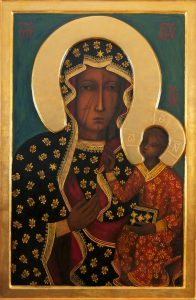 Today is not just another feast of Mary, the Mother of God. No, it is the feast of Our Lady of Czestochowa, Queen of the Slavs, Queen of the World.
Today is not just another feast of Mary, the Mother of God. No, it is the feast of Our Lady of Czestochowa, Queen of the Slavs, Queen of the World.
Since I was a boy Our Lady of Czestochowa has been of keen importance to me. She even is the image on my iPhone.
Here is a beautiful article on this image of Our Lady by John Sikorski, a PhD student at my alma mater, the University of Notre Dame.
May we stay close the Mother of God.
Our Lady of Czestochowa, pray for us.
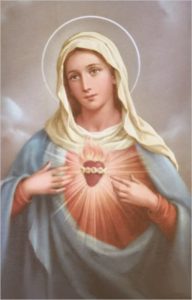 In the midst of the second world war Pope Pius XII put the whole world under the special protection of our Savior’s Mother by consecrating it to her Immaculate Heart, and in 1944 he decreed that in the future the whole Church should celebrate the feast of the Immaculate Heart of Mary. This is not a new devotion. In the seventeenth century, St. John Eudes preached it together with that of the Sacred Heart; in the nineteenth century, Pius VII and Pius IX allowed several churches to celebrate a feast of the Pure Heart of Mary.
In the midst of the second world war Pope Pius XII put the whole world under the special protection of our Savior’s Mother by consecrating it to her Immaculate Heart, and in 1944 he decreed that in the future the whole Church should celebrate the feast of the Immaculate Heart of Mary. This is not a new devotion. In the seventeenth century, St. John Eudes preached it together with that of the Sacred Heart; in the nineteenth century, Pius VII and Pius IX allowed several churches to celebrate a feast of the Pure Heart of Mary.
Pius XII instituted today’s feast of the Immaculate Heart of Mary for the whole Church, so as to obtain by her intercession “peace among nations, freedom for the Church, the conversion of sinners, the love of purity and the practice of virtue” (Decree of May 4, 1944). In 1942 during the ravages of World War II, Pope Pius XII dedicated the world to the Immaculate Heart of Mary and set the feast for August 22nd.
In 1969, Pope Paul VI moved the celebration of the Immaculate Heart of Mary to the day, Saturday, immediately after the Solemnity of the Sacred Heart of Jesus.
(cf. DG for text)
Today, let’s beg for the gift of “peace among nations, freedom for the Church, the conversion of sinners, the love of purity and the practice of virtue.”
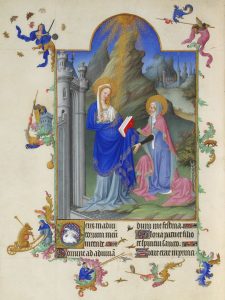 Today we celebrate the Feast of the Visitation of the Blessed Virgin Mary. It is the in-breaking of God’s joy in history.
Today we celebrate the Feast of the Visitation of the Blessed Virgin Mary. It is the in-breaking of God’s joy in history.
The theological explanation of the Vistiation reminds us that at the annunciation, the Archangel Gabriel informs Mary that her cousin Elizabeth is six months pregnant. A startling divine gift.
Then we see Mary hurrying to visit Elizabeth. An interior in-breaking extroverting itself.
I think the key here is Mary’s selflessness and her sharing in the joy of God. Containing the joy she feels is impossible. In her visitation Mary brings the joy of God to both Elizabeth and to John the Baptist who moves in Elizabeth’s womb.
As we know, this second of the joyful mysteries of the Rosary is about Joy who desires to expand into our heart and abide there. Let’s pray for the movement of joy in our life today.